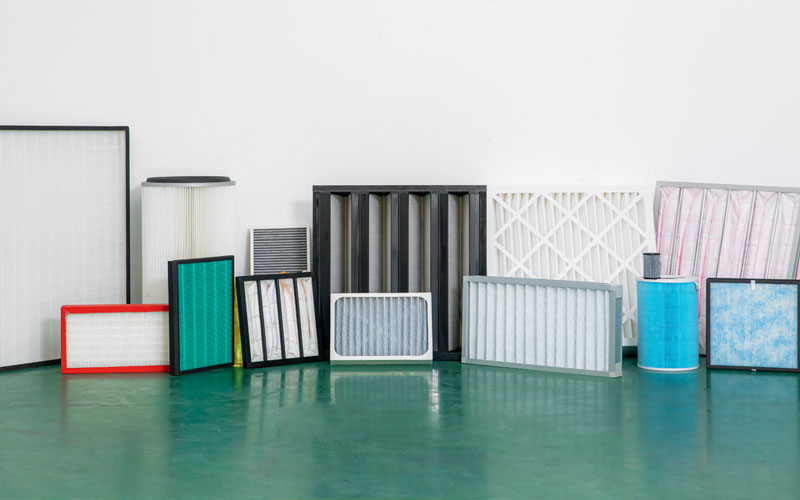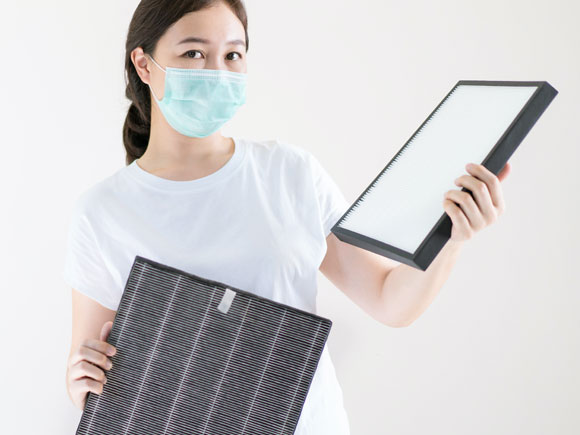
We know how important it is to have the best HEPA filter, manufacturer. Hepa filters are essential to keeping your home or office safe from allergens, dust, and other dangerous pollutants.
A HEPA filter is a special type of filter used to remove 99% of particles from the air that passes through it. This makes them perfect for use in HVAC systems and air purifiers.
If you want to find out more about how to choose the best HEPA filter manufacturer, then read on!
What is a HEPA filter? How to choose the right HEPA filter?
HEPA filter stands for High-Efficiency Particulate Air a type of air filter that is used in HVAC systems, air purifiers, and for many other applications. They are designed to remove 99.97% of particles 0.3 microns or larger from the air passing through them.
Choosing a HEPA filter for your home and business, consider how much airflow you need to move through the room where it will be installed. If you want to use an air conditioner, for example, you’ll need to make sure that there is enough airflow from your central A/C unit to circulate the entire area covered by your filter.
If you have pets in your house or if there are smokers living with you, it’s also important to choose a filter that will be able to remove pet dander and cigarette smoke from the air around them. Some filters are more effective at this than others so make sure you read this article before purchasing one!
What is a HEPA filter, and how does it work?
The HEPA filter can be described as a fibrosis-based air filter that is a high-efficiency particulate air filter, which is the standard of air filtering effectiveness. HEPA filter vacuums are recommended for minimizing dust, dander, and other common allergens in homes.
The HEPA filter isn’t like a typical air filter you install inside your house. HEPA filters are mechanical air filters pleated significantly to trap the particles. The pleats form the appearance of a mat of fibers that are randomly placed. The random and dense array of fibers within the HEPA filter helps to capture various sizes of particles. When air particles enter the filtering system, they get captured through three different methods: interception, diffusion, and impaction.
Diffusion: Diffusion happens in the HEPA filter when gas molecules that are less than 0.1 microns collide with one another and are delayed when they pass by the HEPA filter. The delay can make it more likely that the subsequent two processes to take place for smaller particles.
Interception: Interception happens when a dust particle is tracked by the air but remains in proximity to the fiber while it moves through. It is based on the fiber’s size and increased by the fact that the diameter of the fiber will be the closest to the particle’s size. The majority of mid-sized particles are captured through interception.
Impaction: Larger particles cannot stay clear of fibers as they move across the air, which is why they have to be embedded in fibers directly.
Electrostatic Attraction: If negatively or positively charged particles are within close proximity of negatively or positively charged fibers, the other side charge creates electrostatic attraction.
HEPA Filter Types

There are various HEPA filter types. They are labeled True HEPA and must be in line with the DOE requirements for HEPA filtering.
True HEPA: A filter for the consumer market that is labeled as True HEPA must be as close as possible in accordance with the DOE’s HEPA air filter standard. In its most efficient form, it must be able to remove 99.97 percent of particulates that measure 0.3 microns.
Absolute HEPA: Sometimes, it’s the same as True HEPA, but it promises a higher level of filtration (up the range of 99.999 percent, at 0.3 millimeters).
HEPASilent: HEPASilent is an exclusive filter that is a combination of electrostatic charge with mechanical filters. The charge that this filter produces is believed to make particles more likely to adhere to the fibers.
Permanent HEPA: Permanent filters are advertised as having the HEPA rating, however, they can be reused and washed instead of being replaced. However, it isn’t recommended to wash HEPA filters since the process of washing can decrease efficiency over time.
HEPA Type: HEPA-type filters perform poorly when it comes to 0.3-micron size for particulate filtering. Without independent testing, there isn’t a reliable method of confirming the effectiveness of air filters.
H13 Medical Grade HEPA: H13 HEPA filters are capable of capturing more than 99.95 percent of particles that are 0.1 microns in size. This makes them the most effective HEPA filters found in typical HVAC appliances.
What are the benefits of HEPA filters?
We have discovered that HEPA filters excel at taking harmful particles out of the air we take in.
However, how will this air filtration benefit you?
- HEPA filtration can ease asthma and allergies
There are a variety of causes for asthma attacks and allergies that can worsen. However, with air purification these particles can be eliminated, thereby easing asthma and allergy symptoms. To take this one more advanced step, you could make use of a vacuum that has a HEPA filter to clean couches, floors, and carpets.
- They can stop the spread of diseases
With Covid-19 turning everyone’s focus to the spread of infections, how they spread and what possible preventative measures, Air Purifier HEPA filters provide an effective solution by reducing the number of airborne pollutants, including viruses within a home or in a restricted space.
- Clean air boosts productivity and performance
People who work in buildings with better indoor air quality feel more motivated and productive. This is because healthy people are more productive—and when employees are able to work at their full potential, companies see higher productivity and stronger performance.
What’s the difference between a HEPA filter and a true HEPA filter?
HEPA filters have become the widely employed filtration method in residential and commercial environments. This is due in part to its ability to capture 99.97 percent of particles 0.3 millimeters, and it is effective in both residential and commercial spaces.
A true HEPA filter or filtration device is the only HEPA filter that truly conforms with the DOE norm for HEPA filtering. It with the highest efficiency and is able to meet the 99.97 percent threshold.
When the HEPA filter is not in compliance with the DOE’s requirements for HEPA filtering, it’s not considered HEPA. Although the filter may still catch particles with a size of 0.3 microns, and have a good percentage of them, until it is proven to be a true HEPA, it can’t claim to be in compliance with the DOE HEPA standards.
Suppose you are purchasing a True HEPA device. In that case, you should be able to find third-party testing which proves that the manufacturer took the correct procedures to conform to the DOI’s HEPA standards and to test its effectiveness.
What is the best HEPA filter manufacturer in China?
HEPA filters are used in many industries, from automotive to medical to air purifiers. They have one thing in common: they’re designed to filter out harmful particles from the air that we breathe.
But how do you choose the best manufacturer in China?
To help guide you through this process, we’ve put together a list of the best HEPA filter manufacturers in China.
AAF
AAF is the air filter manufacturer and distributor in the world. Its products are sold under the trademark American Air Filter and AAF brand. AAF is the leader in purification methods and the most recent research on the latest high-tech products. AAF’s offerings include industrial, commercial and residential air purification, a system for controlling air pollution, and gas turbine filtering that are widely used in the pharmaceutical, electrical hospitals, automobile, and manufacturing industries.
Camfil
Camfil is a leading producer of high-quality cleaner air solutions. They provide industrial and commercial solutions for air filtration and the control of air pollutants that enhance the efficiency of equipment and employees as well as reduce energy usage and improve human health as well as the environment. They believe that the most effective solutions for their clients are the best for our planet.
Compo
Compo is a professional manufacturer of HEPA filters in China. We have more than 10 years of experience in manufacturing HEPA filters. Our HEPA filters are made of H13 HEPA filter material which results in a better filtration effect than other types of HEPA filter materials. The filter’s particle size is less than 0.3 microns, which meets the national standards for clean air requirements for indoor dust pollution control equipment.
Our company has developed into a large-scale enterprise with over 100 employees, including R&D personnel, production engineers, and sales staff. One of our advantages is that we own an independent quality control department, which ensures the quality of our products at each stage of production. The products are also tested by third-party institutions before they are delivered to customers.
We can make your own custom sizes. If you are choosing Compo to be your HEPA filter manufacturer, you will not only get good quality products but also get favorable prices.
How to choose the right HEPA filter?
When you’re choosing a HEPA filter, it’s important to keep a few things in mind.
Here are some steps to help you choose the right one:
1. Choose a quality brand.
It’s important to make sure that the HEPA filter you choose is made by a reputable company with a good reputation. It’s also important to make sure that the quality of workmanship and materials used in manufacturing are high, as this will ensure that your filter will last longer and be more effective at filtering air than low-quality ones.
2. Choose the right size.
The size of your HEPA filter will depend on how large your space is and how often it needs to be replaced. If you have a smaller area to clean, such as an office or home office, then a smaller HEPA filter may be sufficient for cleaning the air in that space. On the other hand, if you have a larger space to clean—for example, a warehouse or warehouse space—then you may need to use multiple filters working together (e.g., one at each end of the building).
3. Choose the quality air filter
Choose a filter that has at least 99% efficiency at 0.3 microns (this means that it will capture 99% of particles that are 0.3 microns or smaller). The higher the efficiency rating, the better!